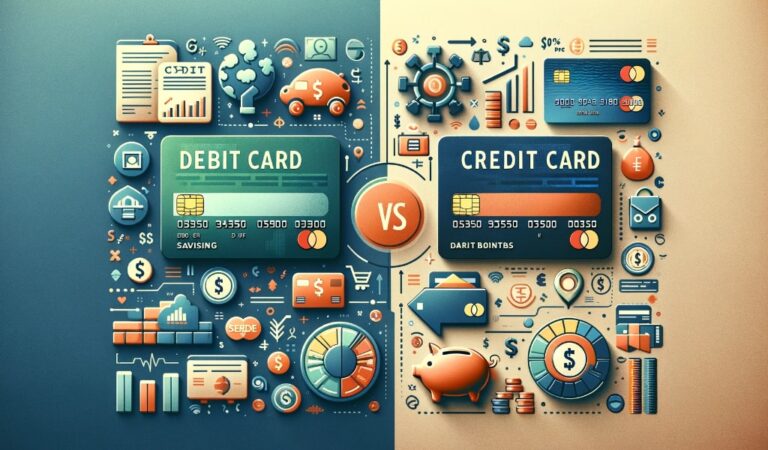Navigating the financial world can be complex, but a fundamental aspect to understand is the difference between debit and credit cards. Both are everyday payment tools, widely accepted and convenient, but they operate on fundamentally different principles and have distinct impacts on your financial health.
Below is an overview of how they are different from one another.
| Debit Cards | Credit Cards | |
| Source of Funds | Directly linked to your bank account. | Borrows money from the issuer, to be repaid later. |
| Spending Limit | Limited by your account balance. | Defined by a set credit limit, often higher than your bank balance. |
| Interest and Fees | Minimal fees, no interest. | Potential for high interest and various fees. |
| Credit Building | Does not affect credit history. | Essential tool for building credit history. |
| Security and Fraud Protection | Direct impact on bank funds, basic protection. | Enhanced protection, no immediate loss of personal funds. |
| Rewards and Benefits | Generally Limited. | Offers rewards and benefits like cash back and travel points. |
| Credit Utilization Impact | No effect. | Can influence credit score. |
| Overdrafts | Can lead to bank fees. | May affect credit score and incur fees. |
More on the difference between debit and credit cards
This guide is designed to demystify these differences. You could gain a more nuanced understanding of these cards. Both types of cards serve different financial needs and purposes. Being aware of these differences enables you to use them effectively and responsibly, aligning them with your financial goals and lifestyle.
1. Source of Funds
Debit Card: Uses your own money from your checking account. Ideal for everyday purchases, it ensures you’re spending within your means, as transactions are declined if funds are insufficient.
Credit Card: Functions as a short-term loan. The issuer provides a line of credit, and you’re borrowing from this allotted amount. This feature can be beneficial for larger purchases or in emergencies, giving you financial flexibility.
2. Spending Limit
Debit Card: Strictly limited by the actual balance in your account. This can help in budgeting and controlling overspending.
Credit Card: The limit is predetermined based on your creditworthiness. This limit can sometimes encourage overspending, leading to potential debt accumulation.
3. Interest and Fees
Debit Card: Usually has no interest charges. Some banks might charge a monthly fee or transaction fees for certain activities, like using an ATM outside the bank’s network.
Credit Card: Interest rates can be substantial, especially if the balance is carried over month to month. Additional fees can include late payment fees, annual fees, balance transfer fees, and foreign transaction fees.
4. Credit Building
Debit Card: No impact on your credit history, as the activity is not reported to credit bureaus.
Credit Card: Regular use and timely payments are reported to credit bureaus, directly affecting your credit score. Responsible usage can significantly boost your credit profile, while mismanagement can harm it.
More on boosting your credit score: Ways to boost your credit score to 800+.
5. Security and Fraud Protection
Debit Card: Provides basic fraud protection. However, if your card is compromised, the funds are taken directly from your bank account, potentially causing immediate financial difficulties until resolved.
Credit Card: Offers more robust fraud protection. In the case of unauthorized transactions, the dispute process doesn’t immediately affect your personal funds, offering a layer of financial safety.
6. Rewards and Benefits
Debit Card: Limited perks, often restricted to basic cashback or small discounts.
Credit Card: Offers a range of rewards, including cash back, travel points, insurance coverages, and exclusive access to events. These benefits can add significant value but should be weighed against potential fees.
7. Credit Utilization Impact
Debit Card: No influence on your credit utilization ratio, a crucial factor in determining your credit score.
Credit Card: High credit card balances relative to your credit limit can negatively impact your credit score. It’s advisable to keep the balance low relative to the credit limit.
8. Overdrafts
Debit Card: Overdrawing your account can lead to substantial overdraft fees. Some banks offer overdraft protection services.
Credit Card: Exceeding your credit limit can result in over-limit fees and can damage your credit score. Some issuers offer alerts to prevent exceeding the limit.
Which One is Right for You? My Opinion


When to use Debit Cards?
If you prioritize budgeting and minimizing debt, a debit card might be more suitable. Debit cards allow you to spend only what you have, making them excellent tools for managing daily expenses and avoiding overspending. They’re ideal if you’re working on strict budgeting or if you’re concerned about accumulating debt.
Additionally, debit cards offer a straightforward way to access your funds without the complexities of credit card fees and interest rates.
When to use Credit Cards?
On the other hand, if you’re focused on building a credit history or seeking rewards for your spending, a credit card could be the better choice. Responsible use of a credit card can help establish and improve your credit score, which is crucial for future financial activities like securing loans with favorable terms.
Credit cards also offer rewards, such as cashback on purchases, travel points, and various protections like travel insurance. However, this option requires discipline in spending and timely payment of your balance to avoid high-interest rates and fees.
The key is to understand and manage your spending habits and financial commitments effectively to make the most out of a credit card.
Bottom-Line
In conclusion, understanding the difference between debit and credit cards is crucial for making informed financial decisions. Debit cards offer a direct and controlled approach to spending, using funds you already have, thus aiding in budget management and avoiding debt.
In contrast, credit cards provide the flexibility of borrowing with the potential for rewards and credit building, but require disciplined spending and timely repayments to avoid high fees and interest rates.
Depending on your financial habits and goals, each card offers unique advantages. By weighing these factors, you can choose the card that best aligns with your financial strategy, whether it’s to maintain a budget, build credit, earn rewards, or a combination of these objectives.



